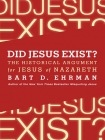Did Jesus Exist? - The Historical Argument for Jesus of Nazareth by Bart Ehrman (ebook reader browser .TXT) 📗

- Author: Bart Ehrman
Book online «Did Jesus Exist? - The Historical Argument for Jesus of Nazareth by Bart Ehrman (ebook reader browser .TXT) 📗». Author Bart Ehrman
Price enunciates another historical principle that I do agree with, however, one that ties in closely with what I just said, that historians cannot repeat the past and so have to base their judgments on evidence that establishes most probably what happened. In Price’s clearly expressed judgment, “The historian does not claim clairvoyant knowledge of the past…. The historian, so to speak ‘postdicts’ based on traceable factors and analogy. But it is all a matter of probabilities.”2 Unlike scientists, who can with almost certain reliability “predict” what will happen based on their knowledge of what does happen, historians “postdict,” that is, they indicate what probably did happen based on their knowledge of the evidence.
But what kind of evidence is there? This is a basic methodological question: How can we establish with reasonable probability that anyone from the past actually existed, whether our aforementioned Abraham Lincoln and Julius Caesar, or anyone else: Harry Truman, Charlemagne, Hypatia, Jerome, Socrates, Anne Frank, or Bilbo Baggins?
The Kinds of Sources Historians Want
HISTORIANS CAN APPEAL TO many different kinds of evidence to establish the past existence of a person. First, there is a real preference for hard, physical evidence, for example, photographs. It is rather hard to deny that Abraham Lincoln lived since we have all seen photos. Of course, the photos could have all been doctored in some insidious plot to rewrite American history. And that is what the conspiracy theorists among us claim (not just about Lincoln but about even better documented events, such as the Holocaust). But for most of us, a stack of good photographs from different sources will usually be convincing enough.
In addition to physical evidence, we look for surviving products that can be traced with relative certainty back to the person. This might include pieces of construction in some cases: the houses and buildings of Frank Lloyd Wright, for example. But in even more cases it would include literary remains, writings. Julius Caesar left us an account of the Gallic Wars. Anne Frank left us a diary. And we have lots of writings that can be traced with some assurance back to a man (also photographed) named Charles Dickens. They all almost certainly existed.
Finally, historians look to other kinds of evidence not from the person but about the person—that is, reference to, quotations of, or discussions about the person by others. These are of course our most abundant kinds of historical sources, the kinds that we have for the vast majority of persons from the past, especially before the invention of photography. What do we look for in evidence of this kind, especially when dealing with someone like Jesus, a person who lived, if he lived, some two thousand years ago? What kinds of sources do historians need to be convinced of his existence?
Historians prefer to have lots of written sources, not just one or two. The more, obviously, the better. If there were only one or two sources, you might suspect that the stories were made up (although you would probably want to have some reasons for thinking so; it is not good enough to doubt a source simply because you have a mean, negative, or pessimistic streak and choose to do so). But if there are lots of sources—just as when there are lots of eyewitnesses to a car accident—then it is hard to claim that any one of them just happened to make it all up.
Historians also prefer to have sources that are relatively near the date of the person or event that they are describing. As time goes on, things do indeed get made up, and so it is much better to have near-contemporary accounts. If our first reports about Moses come from six hundred years after he allegedly lived, those reports are not nearly as trustworthy as reports that can plausibly be dated to six years after he lived. The closer in temporal proximity, the better.
Historians also like these numerous and early sources to be extensive in scope. If all you have is the mere mention of a person’s name in a source, that is not nearly as good as having long and extensive stories told (in lots of ancient sources). Moreover, it is obviously best if these extensive stories are reported in sources that are disinterested. That is to say, if someone is biased toward the subject matter, the bias has to be taken into account. The problem, of course, is that most sources are biased: if they didn’t have any feelings about the subject matter, they wouldn’t be talking about it. But if we find stories that clearly do not serve the purposes of the persons telling the story, we have a good indicator that the stories are (reasonably) disinterested.
Moreover, in an ideal situation, the various sources that discuss a figure or an event should corroborate what each of the others has to say, at least in major points if not in all the details. If one ancient source says that Octavian was a Roman general who became the emperor but another source says that he was a North African peasant who never traveled outside his native village, you





Comments (0)